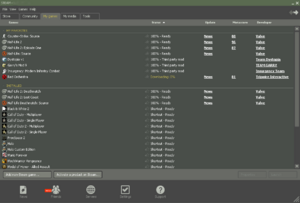Steam (content delivery)

Steam is a content delivery system created by Valve Corporation. Its primary use is digital distribution of game software, although it has other features such as game server browsers, friend lists, automatic updates for supported games, and digital rights management. Popular personal computer games such as Half-Life 2 and Counter-Strike are distributed and managed through Steam.
History
Development on Steam began on an uncertain date prior to 2002. Its codenames before 'Steam' were 'Grid' and 'Gazelle'. Steam replaces WON, Valve's original authentication system for older games such as the original Half-Life.
Features
Users can download demos of game software as well as video previews for games. The Steam Community feature lets users create a Steam ID page for themselves, showing what games they have played recently, their friends list, and how many hours of games they have played in the last two weeks. Steam also gives users a rating from one to ten, depending on how often they play games.
Users get a "SteamID" when they sign up for Steam. This ID is a digit showing their member number. It can be used to see how long someone has been a member of Steam, as the digit number rises with each new Steam user. Users who connect to a game server are identified by their SteamID.
Purchases
Steam allows users to purchase game software through the Steam client. Instead of receiving a game box, CD, DVD, or a serial, the game is downloaded from the Steam servers and is added to a user's Steam account. This game software can then be downloaded to any PC that the user desires. Games can either be bought individually (with some exceptions) or as part of a “package” of multiple games, if one is available, which will provide better value for money.
Valve Anti-Cheat
Valve Anti-Cheat (known more commonly as "VAC") is Valve's anti-cheating solution for Steam games.
Free Weekends
Free weekends are promotions in which a game becomes free to play for a weekend, or sometimes for an entire week. After the free period is over, the game remains installed, but becomes unavailable to play; at this point, the user can choose to purchase the game to continue playing, or delete it. Valve have stated that these free weekends usually increase sales volume, both on Steam and at retail.[1]
Free weekends are sometimes criticized by existing players for flooding a game’s servers with newbies, and allowing cheaters free reign.
Security
Payment information is transmitted over SSL.
Criticism
Software available through Steam
As of January 2010, game software from the following developers are available on Steam:
- 1C Company
- 2K Games
- Activision
- ACE Team
- Aspyr Media
- Atari
- Atlus
- Basilink Games
- Bethesda Softworks
- Bohemia Interactive Studio
- Capcom
- CCP
- Codemasters
- Electronic Arts
- Eidos Interactive
- id Software
- Kalypso Media
- Konami
- LucasArts
- Majesco
- Midway Games
- MumboJumbo
- NCSoft
- NovaLogic
- Paradox Interactive
- PopCap Games
- Rockstar Games
- Sega
- Sony Online Entertainment
- Square Enix
- Strategy First
- THQ
- Ubisoft
- Valve
- Warner Bros.
Steam Deck
In February of 2022, Valve released the Steam Deck, a handheld console that allowed players to play games from their Steam library on the go. On release, the console was heavily criticized for being buggy[2]. Valve has rolled out countless updates and fixes since release, leading to improved reception. Not every game on Steam is available on the Steam Deck; developers must make their games Steam Deck compatible. The Steam Deck allows custom control schemes to be set so players can translate games typically controlled with a mouse and keyboard to the console how they like.
References
- ↑ Minkley, Johnny (7 March 2009). Valve: Steam can boost boxed sales. GamesIndustry.biz. “When we do our free weekends on Steam for our products... we'll see a spike in sales at the end of the weekend on Steam and at retail.”
- ↑ Hollister, Sean (28 Feb 2022). Steam Deck review: it’s not ready. theverge.com.

